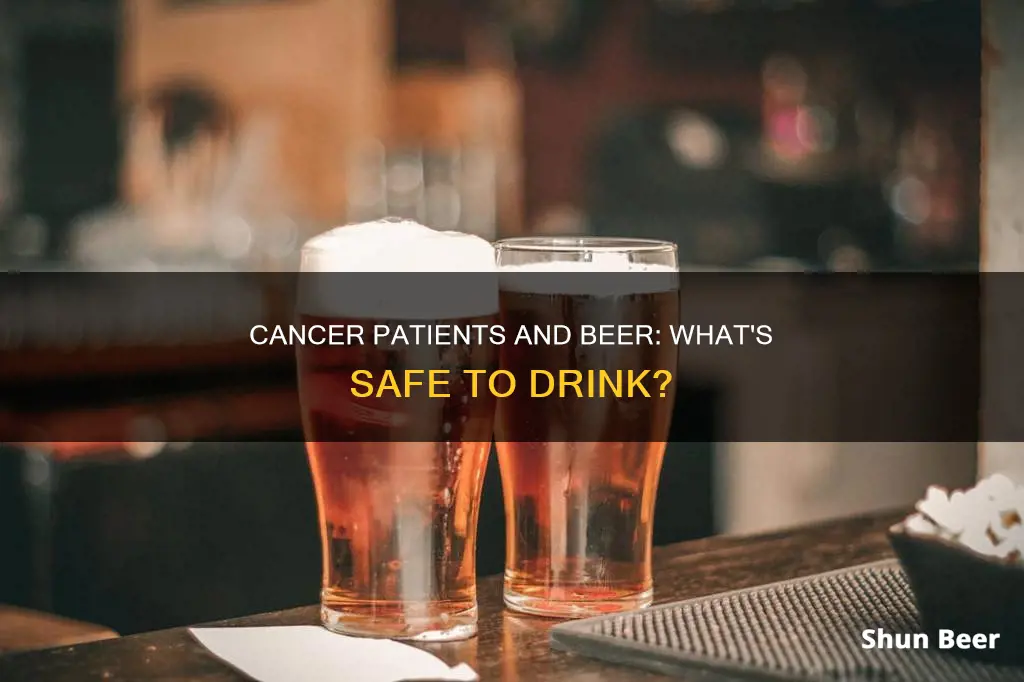
Alcohol is a known carcinogen, with drinking linked to an increased risk of several types of cancers. Alcoholic drinks contain ethanol, which is broken down by the body into acetaldehyde, a known carcinogen that damages DNA and stops cells from repairing that damage. This can allow cancerous cells to grow.
The more alcohol a person drinks, the higher their risk of developing an alcohol-associated cancer. Even those who have no more than one drink per day and binge drinkers have a modestly increased risk of some cancers. According to the National Institute on Alcohol Abuse and Alcoholism, a standard alcoholic drink in the United States contains 14 grams of pure alcohol, which is found in 12 fluid ounces of beer.
For cancer prevention, it's best not to drink alcohol. However, if cancer patients choose to drink, consumption should be limited to no more than one drink per day for women and two drinks per day for men. Alcohol can worsen the side effects of chemotherapy and can also interfere with chemotherapy treatment.
| Characteristics | Values |
|---|---|
| Cancer risk | Alcohol increases the risk of mouth, pharynx, larynx, lung, pancreatic, skin, oesophageal, laryngeal, stomach, colorectal, liver, pancreas, prostate, breast, central nervous system, and blood cancers. |
| Cancer treatment | Alcohol can interfere with chemotherapy treatment, worsen mouth sores, and cause liver inflammation. |
| Cancer recurrence | Alcohol increases the risk of cancer returning. |
| Weight gain | Alcohol contributes to weight gain, which is a risk factor for cancer. |
| Bone marrow function | Alcohol interferes with the healthy production of white blood cells, red blood cells, and platelets in the bone marrow. |
| Sleep | Alcohol can worsen fatigue. |
| Nausea | Alcohol can worsen nausea caused by radiation therapy or chemotherapy. |
| Liver health | Alcohol can cause liver damage. |
What You'll Learn

Cancer patients should consult their doctor about drinking alcohol during treatment
Alcohol is a known carcinogen, and drinking it can increase the risk of developing several types of cancer. It is also linked to an increased risk of cancer recurrence in survivors. For instance, studies show that breast cancer survivors who drank more than three to four drinks per week were at a higher risk for recurrence.
Additionally, alcohol can interfere with cancer treatment, including chemotherapy and radiation therapy. It can cause irritation to the stomach and gastrointestinal tract, similar to the side effects of these treatments. It can also worsen mouth sores caused by treatment.
Alcohol is processed by the liver, and many chemotherapy drugs are broken down by the liver as well. This means that drinking alcohol during treatment can cause additional stress and possibly permanent damage to the liver.
It is generally recommended that cancer patients avoid drinking alcohol during treatment. However, this may be a difficult lifestyle change for some, and it is important to consult with a doctor for specific advice. They will be able to advise on whether it is safe to drink alcohol during treatment, depending on the type of cancer and treatment.
Cancer patients should be honest with their healthcare team about their alcohol consumption so that the team can help them cut back slowly if necessary. Stopping alcohol abruptly can lead to serious health effects.
It is important to note that there is no safe amount of alcohol when it comes to cancer risk. Even moderate drinking increases cancer risk.
The Chemistry of Beer: How It Works and Why It Matters
You may want to see also

Alcohol can cause irritation to the stomach and gastrointestinal tract
Alcohol can irritate the stomach and gastrointestinal tract, causing what is known as alcoholic gastritis. This is when the stomach's inner lining is inflamed or worn down due to alcohol consumption. Alcoholic gastritis can cause a gnawing, burning ache in the stomach, constant pain between the navel and ribs, belching, hiccuping, and a bloated or full feeling in the stomach.
Alcoholic gastritis is caused by drinking too much, too often. The alcohol irritates and erodes the stomach lining, triggering gastritis symptoms. The condition can be treated with medication, but quitting or cutting back on alcohol is also necessary for the treatment to be effective.
Alcoholic gastritis can lead to serious problems, including anemia, peptic ulcers, gastric polyps, and stomach tumors.
In addition to causing irritation to the stomach and gastrointestinal tract, alcohol can also increase the risk of mouth, pharynx, and larynx cancers. It is also linked to an increased risk of esophageal, stomach, and colon cancers.
Drinking Beer in an Uber: Is it Allowed?
You may want to see also

Alcohol can worsen side effects of cancer treatment
Alcohol can worsen the side effects of cancer treatment. Firstly, alcohol interferes with the healthy production of white blood cells, red blood cells, and platelets in the bone marrow. This can be particularly harmful to patients with blood and marrow cancers, such as leukaemia, lymphoma, and myeloma, as their bone marrow function may already be strained. Alcohol can also worsen the fatigue that results from cancer and its treatment, and it can add to the sedative effects of medications used to control pain and nausea.
In addition, alcohol causes irritation to the stomach lining and gastrointestinal tract, which can be particularly harmful to patients experiencing oral mucositis or mouth sores as a result of their treatment. Alcohol also impacts the liver, which is used to break down many chemotherapy drugs. The additional stress alcohol places on the liver can cause permanent damage to the organ.
For these reasons, it is generally recommended that cancer patients avoid drinking alcohol during treatment.
Breastfeeding and Beer: Is One Drink Okay for Baby?
You may want to see also

Alcohol can cause permanent damage to the liver
Alcohol-related liver disease (ARLD) is a common but preventable condition. ARLD refers to liver damage caused by excess alcohol intake. The liver is a resilient organ, capable of regenerating itself. However, prolonged alcohol misuse over many years can reduce its ability to regenerate, resulting in serious and permanent damage.
ARLD encompasses three stages, which often overlap:
- Alcoholic fatty liver disease: This is the first stage of ARLD and occurs when drinking a large amount of alcohol, even for just a few days, leads to a build-up of fats in the liver. This condition rarely causes symptoms but is a warning sign of harmful alcohol consumption. It is reversible if you stop drinking alcohol for an extended period.
- Alcoholic hepatitis: Alcoholic hepatitis is an acute inflammation of the liver that can be caused by long-term alcohol misuse or binge drinking. It involves the death of liver cells, followed by permanent scarring. Mild alcoholic hepatitis causes slow liver damage over many years, while severe alcoholic hepatitis can be life-threatening and sudden. This condition is also reversible if you permanently abstain from alcohol and make necessary dietary changes.
- Alcoholic cirrhosis: Cirrhosis is a stage of ARLD where the liver has become significantly scarred. This stage is generally irreversible, but stopping alcohol consumption immediately can prevent further damage and increase life expectancy.
The effects of alcohol on the liver depend on the amount consumed and the duration of consumption. Abstaining from alcohol or drinking in moderation can lower the risk of liver disease. According to the Centers for Disease Control and Prevention (CDC), moderate alcohol consumption is defined as up to one drink per day for women and up to two drinks per day for men.
To improve liver health, it is essential to cut down on alcohol consumption. Additionally, maintaining a healthy diet, exercising regularly, managing weight, and protecting against hepatitis are recommended.
Vaccine and Beer: What's Safe to Drink?
You may want to see also

Alcohol increases the risk of cancer recurrence
Alcohol is a known cancer-causing agent. Ethanol, found in all alcoholic drinks, and acetaldehyde, its metabolized form, are both carcinogens. Ethanol breaks down into acetaldehyde, which disrupts DNA synthesis and repair, contributing to the carcinogenic effect.
Alcohol also interferes with the absorption of vitamins and minerals that protect the body from cancer, such as vitamins A, B1, B6, C, D, E, K, and folate, iron, and selenium. It can also cause weight gain, which is linked to over 12 types of cancer.
Alcohol can increase the risk of cancer recurrence in survivors. Studies have shown that breast cancer survivors who drank more than three to four drinks per week were at a higher risk of recurrence.
The American Cancer Society recommends that cancer survivors limit alcohol consumption to no more than one drink per day for women and two drinks per day for men.
Beer and Creatine: Mixing Alcohol and Supplements
You may want to see also







